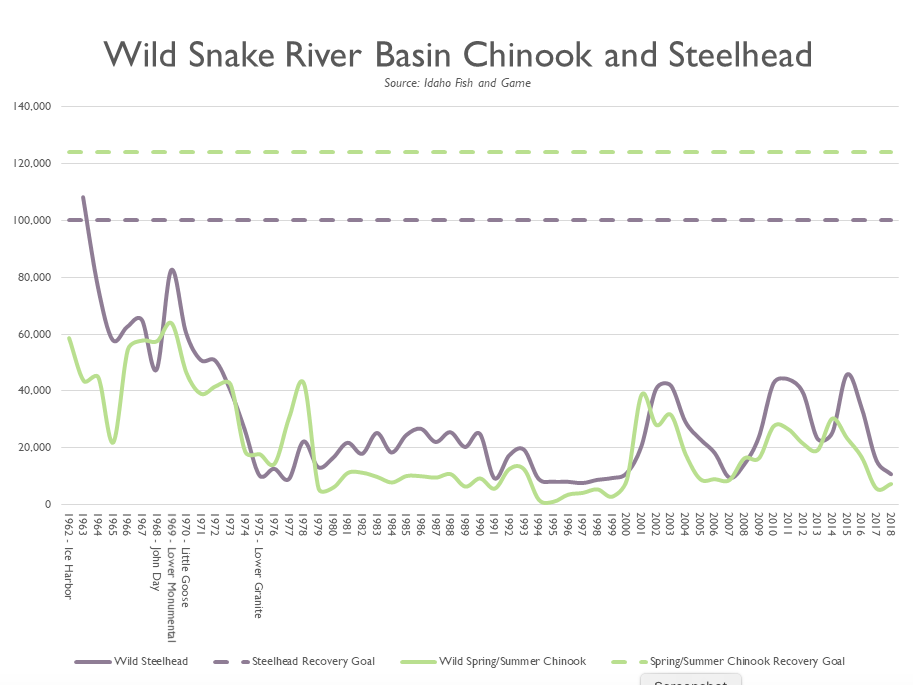forum
library
tutorial
contact

Dam Breaching Incurs the
Law of Unintended Consequences
by Rick Rogers
Lewiston Tribune, September 8, 2019
|
the film forum library tutorial contact |

|
Dam Breaching Incurs the
by Rick Rogers
|
 "Study: Breaching dams would pay off" (Lewiston Tribune headline, July 31). This follows an April 4 article indicating some "experts" believe it possible to replace the four lower Snake River dams with wind power and solar. I'm afraid my first words in both cases were a little unkind: "horse apples."
"Study: Breaching dams would pay off" (Lewiston Tribune headline, July 31). This follows an April 4 article indicating some "experts" believe it possible to replace the four lower Snake River dams with wind power and solar. I'm afraid my first words in both cases were a little unkind: "horse apples."
I really need to watch my language.
The "study," titled the "Lower Snake River Dams Economic Tradeoffs of Removal," was done by ECONorthwest for Seattle-based Vulcan Inc., a company founded by the late Paul Allen.
Doing my due diligence, I read the executive summary of this "study" online. Twice. The summary proves to be a perfect example of the authors' ability to assume human behavior, tap dance with statistics and simply lie by omitting important considerations.
I'm all for renewable energy resources (we have solar power on our home, for example). One of those renewable resources is hydropower, which the Northwest has in abundance. I'm old enough to remember when the dams were first proposed. I watched in alarm as the Army Corps of Engineers abused government's eminent domain powers to move private citizens and businesses off the river to build the necessary levees.
The powers that be at the time "mitigated" the dams' effect on fish by building a hatchery at Ahsahka. This was when Middle East sheikdoms were gouging us with oil prices and supply, and few people (other than Nez Perce tribal members) were worried about fish.
A big selling point for the dams was flood control. The current powers that be (today's environmentalists) are apparently not worried at all about flood control. This is typical of environmentalists pushing government programs and ignoring the law of unintended consequences.
Almost universal in any human endeavor, unintended (or unanticipated) consequences are outcomes (or additional results) not foreseen and/or intended by a purposeful action. The term was originally popularized by American sociologist Robert Merton.
In her Aug. 3 letter to the editor, Tribune reader Marie Eier beautifully described the downstream flooding environment she saw and experienced in the region before the dams. Let's all thank God for citizens senior enough to remember our history.
One would expect the study ballyhooed in the Tribune's headline would at least analyze the flood control issues that might arise from removing these dams. One would be disappointed. In a glaring omission, the executive summary doesn't even mention flood control.
Completely eliminating potential flood control costs contributes to the authors' claim of an $8.6 billion savings by removing the dams.
"Horse apples" again, say I.
Any businessman would also expect that the original cost of the dams and levees would be considered as sunk cost and, (inflation-adjusted) applied (as cost) to any cost/benefit calculations. That expectation would also be dashed; it didn't fit Allen's agenda.
This writer has sought in vain to decipher why Allen took on this project without considering what the eastside population (and government representatives) thought about it.
Probably, Allen didn't plan on being dead when the dams fell, so he could chortle and rub his hands in glee with the best of evil-dealing billionaires. Unfortunately for him, he discovered that even great wealth doesn't excuse one from the final judgment.
To assume, as this study apparently does, that removing the dams will have no cost effect on downstream flooding flies in the faces of those earlier wizards who thought that the dams would provide flood-control benefit. That was, after all, back in those prehistoric days of the 1960s and 1970s.
The ECONorthwest authors apparently believe, without evidence, that the level of the Snake River can return to pre-dam levels, and miraculously the river will settle at the correct temperature for fish. At the same time, the shoreline will (instantly and without cost) re-grow all the native trees and grasses that formerly bordered the river. And there will be an immediate, cost-free and beneficial result for all the other local flora and fauna.
Like the unicorns.
It's unimaginable the result could instead be a muddy breeding ground for every unwanted weed and insect possible.
I propose a "study" on the rate of intellectual deterioration of government and political beings during the past 50 years.
It must be nice to work for government (or a Paul Allen company) and live in an imaginary world.
learn more on topics covered in the film
see the video
read the script
learn the songs
discussion forum
